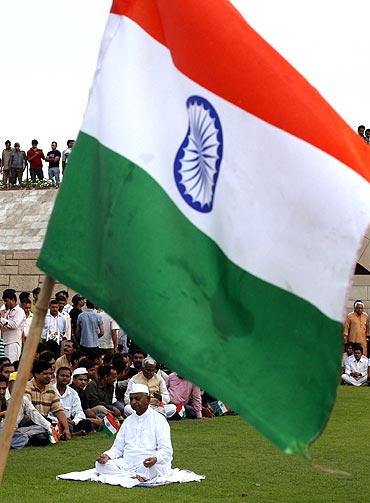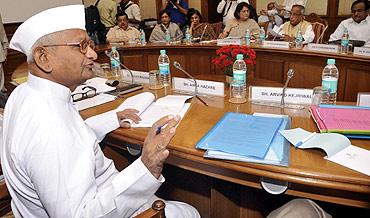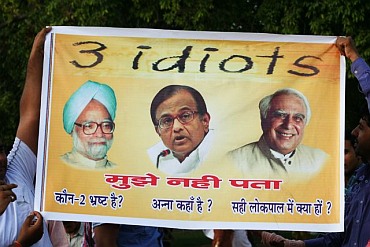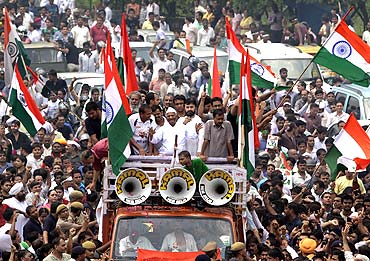 | « Back to article | Print this article |
'Critiquing people not the job of politicians or media'
This moment would be remembered as the lowest to which the collective intelligence of people can descend to, says Apoorvanand
The drama that is being enacted in Delhi for the last one week, rather five months, has thoroughly exposed the intellectual hollowness of the political life of India.
This moment would also be remembered as the lowest to which the collective intelligence of a people can descend to. Critiquing people is not the job of the politicians or the media, not in our times at least.
Gone are the days when you had a Mohandas Karamchand Gandhi who could stand up to the masses and withdraw a popular movement risking their wrath or a Jawaharlal Nehru who commanded the authority to chide his own people. The days of Rabindranath Tagore are also over, who had the courage to openly challenge, criticise a saint like Gandhi and write 'anti-people' novels like Ghare Baire.
If we have time and patience to turn the pages of our history, we would find that their criticism was an integral part of their long and continuous engagement with their people. Theirs was not a utilitarian relationship. People knew that they love them and care for them and that is why they never turned away from them.
Click NEXT to read further...
'Democratic politics are about relationships and continuous exchange'
The names we have mentioned above belong to an era when the grammar and vocabulary of popular politics were being transformed. They refrained from simplifying things and devised a language which people were challenged to learn. It was their inexhaustible trust in the intelligence of their people that encouraged them to constantly innovate and complicate rather than simplify.
It was this air which a young man Bhagat Singh was breathing, who, going against the grain, wrote that violent methods were no substitute to popular political mobilisation, who knew that the appeal of Subhas Chandra Bose was dangerous and it was Nehru, with a scientific and internationalist outlook, he advised the youth to follow.
Democratic politics is about relationships and continuous exchange. Leaders go to the people not only with grand proclamations but also with their dilemmas. They talk to and not at the people. They honestly think with the people. That is how a relationship is born and nurtured. Dialogue keeps democracy alive -- dialogue at every level that is ceaseless. That is what keeps parliamentary politics going.
Prime ministers are not managers and a defeated political party too has to be recognised to have an agency and ownership in the affairs of the country. It is this spirit of dialogue which gave confidence to Prime Minister Nehru to keep talking to agitators in Maharashtra who nursed a hurt in their hearts by his description of Shivaji in the Discovery of India.
Click NEXT to read further...
'Backroom managers have no relationship with the masses'
Nehru had the courage of civility to write to a much younger Communist leader S A Dange asking him if he really believed that he was disrespectful to Marathas.
When you refuse to invite the opposition or your critics to participate in the process of governance and want to be seen as the sole claimant you do not connect. The government did exactly this when it negotiated with the 'civil society' leaders keeping the opposition and other voices at bay. That was undermining the spirit of parliamentary democracy.
That is why its invocations of the virtues of the supremacy of parliamentary democracy sound as an afterthought and do not inspire confidence.
Nehru's anger is famous but he was never charged with smugness. He never kept long silences. He never left it to party managers to do trouble shooting for his government.
What we now see is a swarm of backroom managers, faceless people who have no relationship with the masses. Why should they listen to a Congress spokesperson Janardan Dwivedi or an Ambika Soni or a Manish Tiwari who only appear on television cameras? Why should they care for the words of a prime minister who seems to be aloof to their worries and concerns? That is why even when he speaks the right words they lack the warmth of conviction.
Click NEXT to read further...
'Expanding the horizon of collective imagination is the job of democratic politics'
Even Indira Gandhi, with all her dictatorial tendencies, always reached out to the people. It is something you cannot outsource. Sonia Gandhi cannot leave it to Rahul Gandhi to practice a politics of empathy and yet continue to hold the post of the leader of the people.
We are talking about people who were leaders, in the true sense of the word. Leaders resist the lure of and refuse to pander to the basest emotions that are part of the collective constitution of a nation or a people.
It does not take much to titillate and arouse them. It does not take much intelligence to understand why Hindus rallied around the issue of Ramjanmbhoomi or why they indulged in mass-killing of Sikhs after the assassination of Indira Gandhi.
To expand the horizon of collective imagination of people is the job of democratic politics. When it chooses to operate in the secure confines of the given imagination and lacks courage and resources to carve out new zones of imagination, the results are disastrous. This is exactly what we are witnessing now.
Click NEXT to read further...
'Simplification can help mobilise people'
Democracy comes entwined with modernity however stale that might sound. It asks people to question their given belief system, their age-old ideas of justice, peace, identity and togetherness.
To cultivate newer forms of sensibility is the task of those who believe in democracy. That is how our modern jurisprudence has developed. This is why law making becomes important. And all this is to practice the art of nuanced thinking.
When you assure the people that you can devise a foolproof instrument that would remove corruption from the kind of society we are living in, you are simplifying things.
Simplification can help you mobilise people. It helps you arouse emotions but it also leads to situations in which you start getting judgements which seek to assuage the collective conscience of the people.
It is the utter failure of the imagination of Indian politics and its complete break with the lives and aspirations of the people which force them back to pre-democratic forms of emotional relationships.
That Indian society is trying to seek solace and assurance in a patriarchal figure and modes of justice which have patriarchy as their source should be a matter of concern for those who fight for recognition of newer forms of relationships. But this moment is not now, it seems.




